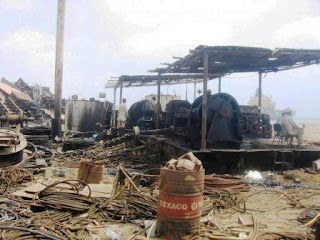Presented by Khalid Hasan Khan of Outfield Productions and Robert Congdon of RockCreek Productions, the documentary Iron Slaves, The Underworld of Labour was recently screened in Karachi
This is the fourth social commentary to come forth from Khalid’s production team, the earlier ones being An Early Sunset (2008) that focuses on soccer players and the popularity of the sport in Karachi’s Lyari area; The Last Refuge of the Afghans (2009) about football in the Pashtoon belt of Balochistan and the Afghan Football Club in Chaman, and Kolachi — The Legend of Mororro (2009) that sheds light on the myths and legends among the fishermen living along the Sindh coast.
With crisp narration by Mohammed Ali, the original version is dubbed in English for international screening and the film festival circuit. Its Urdu version is only available for screening in Pakistan
The 50-minute documentary has spot interviews and shots of the shipbreaking yards with attention to the workers’ pressing issues of non-payment of wages and the lack of basic amenities.
Images on Sunday spoke to the director after the screening and this is what he had to say:
Q. What were some of the problems you faced during the making of Iron Slaves?
KHK: Although Gadani is just 70 kms from Karachi
Gadani is the biggest natural set I have ever seen but at the same time it is quite hazardous to shoot there. Workers die when a wire or rope snaps, and they can’t gain access to a ship without endangering their lives.
The place is basically no man’s land for film-makers also. This is the reason why no one has ever made a documentary on this subject. The henchmen of the shipbreaking yards’ owners intimidate both you and those you work with. We don’t know what harmful levels of toxic fumes and other carcinogenic elements my team and I inhaled or consumed during our stay and work there. But we remained undaunted even in the face of such adversity as we had to expose this ‘slave’ trade by lifting the ‘iron’ curtain.
Q. What made you focus on the plight of the shipbreaking industry workers?
KHK: I once saw a news item that said that the Gadani shipbreaking industry is thriving as 65 ships arrived while more are on their way. Then I read about similar yards in India and Bangladesh
To me labour creats an industry that in turn drives the economy. No industry can prosper in the long run where labour is languishing.
Iron Slaves, the Underworld of Labour specifically points towards the blatant abuse of rights of the Gadani workers. I say exploitation anywhere is a threat to basic rights everywhere. We managed to capture these violations of basic human rights in order to bring it to the attention of the government and human rights and labour rights groups.
Q. How has the response been so far?
KHK: Quite great, really. The HRCP and PILER, Karachi
Roland deSouza from the HRCP was very helpful as well and the response of audience was evident during the screening who empathised with the characters who had to offer nothing but their blood, tears and sweat. If, as a documentary film-maker, you leave the audience sombre then you have done your job.
Q. What about international collaborations?
KHK: For Iron Slaves, I signed a co-production agreement with RockCreek Productions LLC, Colorado
Q. Who comprises your production team? What about finances?
KHK: Our production team is multi-lingual and multi-talented. The team members are volunteers who put in their time and money for projects. Najmul Absar is Unit Production Manager, D.M. Saeed is the Director of Photography who is from Balochistan. Mohammad Ali is a brilliant narrator. Zahid Raja is an associate producer while Ravina Majid is the executive producer and coordinator of projects.
Interestingly, none of them has a background in film or TV. One common denominator among them is the passion to work for the underprivileged. We contribute money from our savings and make shoestring budget films. This documentary was totally financed by our core team members.
Q. Do you think there will be any follow-up by the NGOs working in this particular sector and/or philantrophists?
KHK: Unfortunately most of the NGOs don’t like to work in far-off places where they are least visible. They want the public eye and the media glare. Poor Gadani suffers as it offers no such attraction.
The real purpose behind Iron Slaves is to make the life of Gadani shipbreakers less miserable. Even if a single person leaves the screening feeling that he should do something to alleviate their suffering, then we have been successful. After the screening, I recieved email from Mohammad Hanif Janoo, a philanthropist, who wants to provide free medical assistance and medicines for the workers. But at the end of the day it is the responsibility of the government and the NGOs to provide them with some kind of relief.
Q. What is your next project?
KHK: Our next project is a sports film titled Barefoot, where we intend to higlight the significance of sports in our society. The focus would be on women and minorities. Other ideas are being taken up with the same philosophy — to give voice to those who can’t speak for themselves and let them be heard.




No comments:
Post a Comment